Climate talks updates: Gov. Jerry Brown heads to Paris for COP21
- Share via
The United Nations Conference on Climate Change, with 150 world leaders gathering near Paris, has an ambitious goal: to limit rising global temperatures this century to no more than 2 degrees Celsius above pre-industrial levels. In the first days of the conference , President Obama pushed for a pact even as the U.S. House moved to block climate rules at home.
California Gov. Jerry Brown is to speak Friday, arriving in France a day earlier than initially planned.
Join us as our coverage of the climate negotiations continues .
Brown shifts Paris schedule to visit San Bernardino after shootings
California Gov. Jerry Brown had been scheduled to leave for Paris for the climate talks, but will head south first, his top aide tweeted.
This evening Brown will be briefed by local, state and federal law enforcement and then speak to the news media.
California signs clean vehicle pledge
California has pledged to ensure all new passenger vehicles sold in the state don’t emit any greenhouse gases by 2050, officials announced on Thursday.
The agreement was announced as California environmental officials arrived in Paris for the United Nations summit on climate change.
Also signing the agreement are 12 other countries, states and provinces, including Germany, Norway, Connecticut, Massachusetts, Oregon and New York.
“Cleaner vehicles will help California and the world combat the threat of climate change,” said a statement from Matthew Rodriquez, secretary of the California Environmental Protection Agency.
He added, "The work we do with other leading states and countries will accelerate growth and provide benefits in California and around the world.”
The agreement is not legally binding, and it applies to personal vehicles like cars and SUVs, not buses.
Reducing pollution from vehicles has been a challenge in California. Almost 40% of greenhouse gas emissions in the state come from transportation.
Assembly speaker and others arrive in Paris
The California wave appears to be rolling in on the streets of Paris.
Assembly Speaker Toni Atkins (D-San Diego) arrived on Thursday in the French capital for the United Nations conference, tweeting a photo taken with the first person she happened to see: Tom Steyer.
Steyer, the San Francisco billionaire environmental activist, is likely going to be one of the state's most sought after VIPs over the next few days. As our man in Paris, Chris Megerian, has reported , Steyer co-signed with Gov. Jerry Brown an invitation letter for business leaders to join them in Paris for events held in conjunction with the official conference.
Bonjour, Paris!
Reporter Chris Megerian is on the ground to cover California's delegation at the climate talks.
Follow him on Twitter and in this space.
Poll: Californians care about climate change
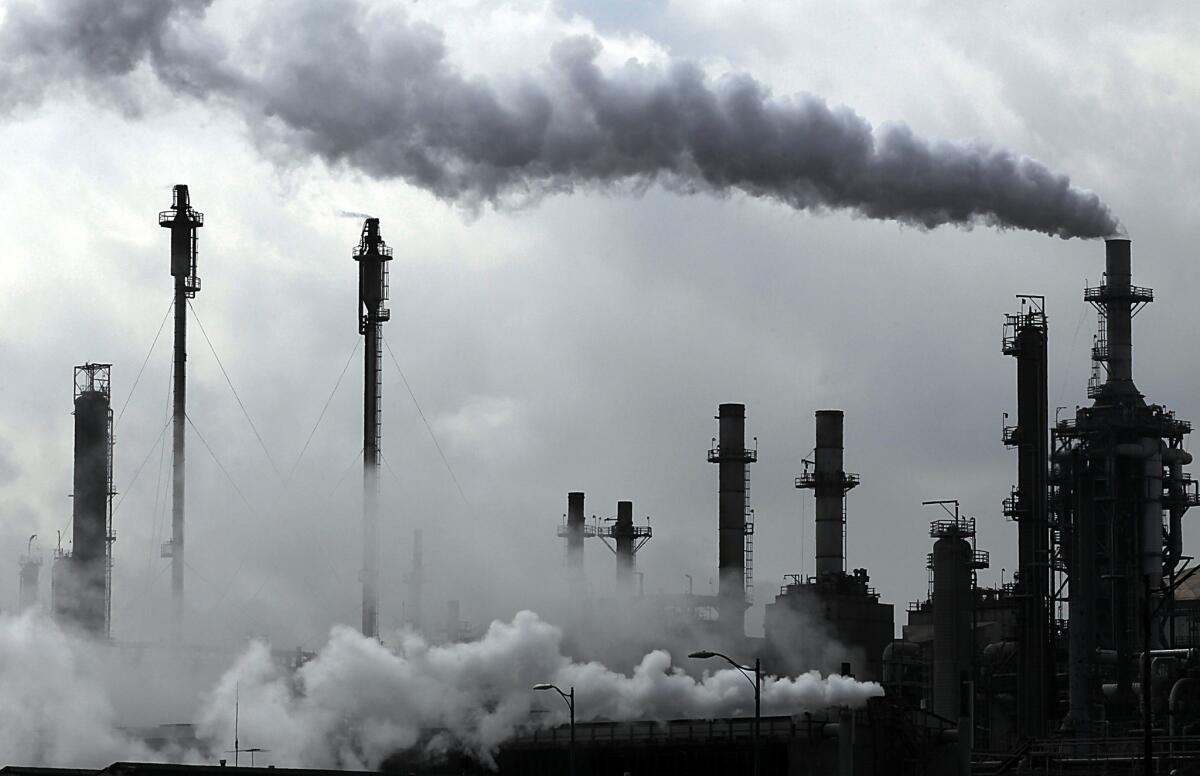
As California's delegation makes its way to Paris, a new statewide poll serves as a reminder that Californians see climate change as a serious issue -- more so than do most Americans.
Wednesday night's poll by the nonpartisan Public Policy Institute of California finds 57% of those surveyed think climate change is a "very serious" problem, compared to 45% of nationwide adults in a recent poll. That's also higher than a recent Pew poll found in France (56%), Germany (55%), and other Western nations.
So which Californians care the most? The PPIC survey finds Latinos (63%) more worried than White adults (43%). And among age groups, Californians age 18-34 (59%) seem to be more concerned than those age 55 and older (48%).
The new data isn't shocking, as it's in line with several years of public polling of Californians on the subject of climate change. But it does seem to underscore the agenda set by Gov. Jerry Brown and legislative leaders.
Also notable: There's not much concern that efforts to combat climate issues will affect the Golden State's economy. Just 19% of those surveyed said that the state's policies would result in fewer jobs. Republicans, though, are more skeptical; the new poll finds 39% of Californians who identify with the GOP think climate change laws will weaken the state's job growth.
Meet the scientists
They needle presidential candidates, advise Pope Francis and help Gov. Jerry Brown make the case for environmental regulations to California business leaders.
Learn more about the scientists Brown turns to on climate change issues.
In their own words
Chris Megerian interviewed some of California's top leaders about the climate talks ahead of their trip to Paris. Here's what they had to say about the Golden State's role at the summit, and why it deserves this moment on the global stage.
Senate panel led by top climate change denier casts doubt on talks
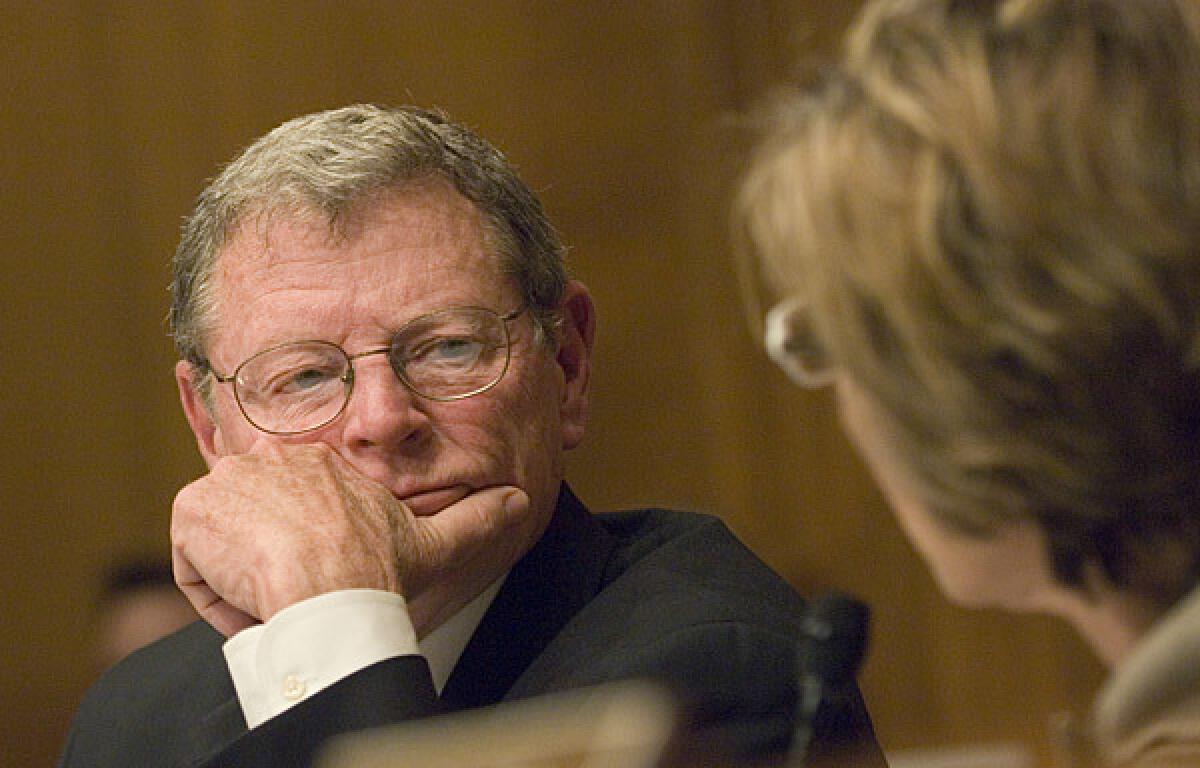
The Senate Committee on Environment released a white paper this week criticizing President Obama's approach on climate change and questioning whether the Paris summit will be fruitful.
The Republican-controlled committee, led by top congressional climate change denier Sen. James M. Inhofe (R-Okla.), criticized Obama's pledge of additional funding for climate change research as "propaganda" designed to "create the illusion that the U.S. will be able to satisfy the demands of the international community."
The report said the Obama administration's approach to negotiations "advances a radical environmental agenda with hollow promises ... at the expense of the U.S. constitution and the welfare of the American people."
Inhofe famously tossed a snowball on the floor of the U.S. Senate this year in an effort to debunk "all this hysteria about global warming."
Read the full white paper here .
Why are so many Californians headed to Paris?
If you’re looking for a leading state politician, environmental activist, government regulator or energy executive, chances are, they’re in Paris for the next week.
California will have a massive footprint at the United Nations summit on climate change in Paris, a symbol of the state’s political commitment to fighting global warming and the business interest of companies that can benefit from clean-energy policies.
“You’ve got to get on the side of nature if you want to prosper,” said Gov. Jerry Brown, who is scheduled to arrive in Paris on Friday.
Besides eight lawmakers and the governor, a number of top Brown administration officials are going to Paris, including Air Resources Board Chair Mary Nichols and Environmental Protection Secretary Matt Rodriquez.
Because California isn’t a country, it won’t be a part of the official negotiations intended to broker a new international accord for fighting climate change. But activists, analysts and government officials said the state has been able to play an important role by demonstrating policies such as the cap-and-trade program, which limits emissions and charges fees to polluters.
“They’ve had a significant effect on the dynamics surrounding the negotiations by taking a leadership role,” said Karen Florini, the State Department's deputy special envoy for climate change. Out of all the states, “California is the most visible and most active.”
Hello, Paris: Californians in place prior to Brown
Gov. Jerry Brown doesn't arrive until Friday, but some of California's unofficial delegation is already on the ground and participating in the events.
One of those is Louis Blumberg, director for California climate change at the Nature Conservancy. His Twitter feed is pretty full of snapshots at U.N. summit events. Earlier today (that's Tuesday afternoon, Paris time), Blumberg was tweeting from an event on protecting tropical forests:
In all, more than three dozen people have been identified as part of the California group attending the conference. Times reporter Chris Megerian filed an early look last month at some of the more prominent Californians attending , as well as a list of the companies that are footing the bill for the travel.
By the way, where's the governor today as folks either make their way to Paris or settle in? He's hosting the lighting of the state Capitol Christmas Tree this afternoon in Sacramento.
Before and after the Beijing smog
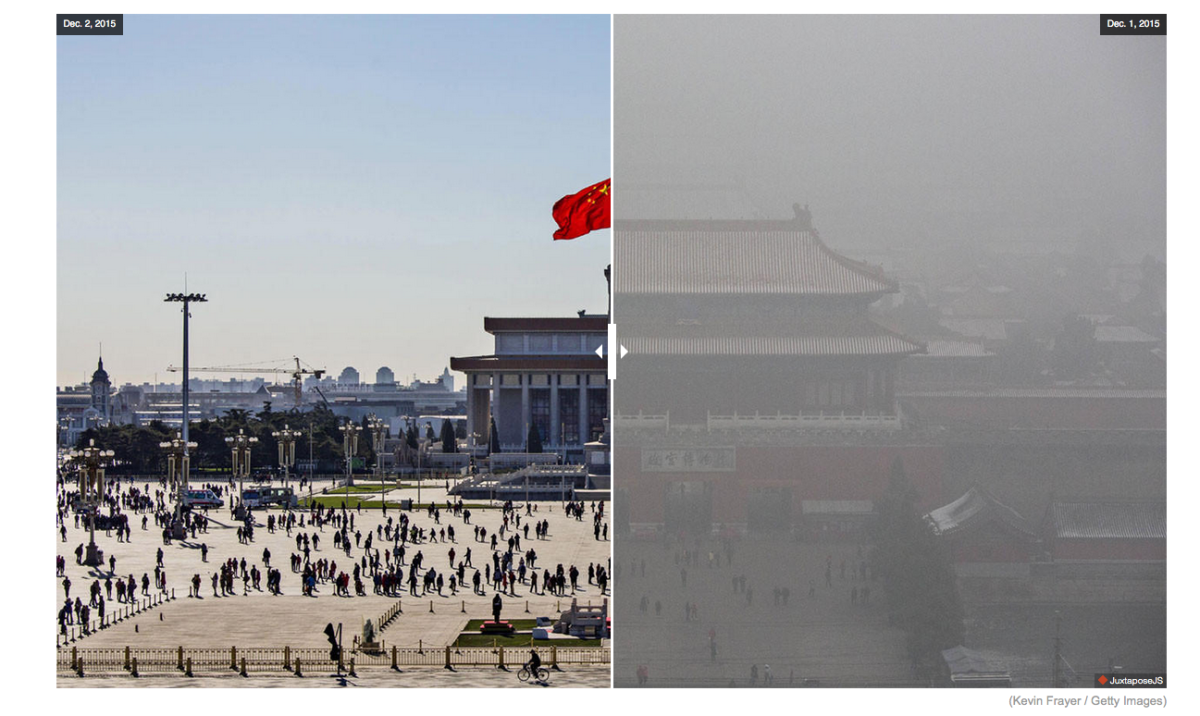
As world leaders headed to Paris, Beijing was shrouded in heavy pollution. A strong north wind arrived late Tuesday and helped clear the sky, showing a stark contrast overnight.
China's capital and many cities in the northern part of the country recorded the worst smog of the year on Nov. 30 and Dec. 1, with air quality devices in some areas unable to read such high levels of pollutants.
Check out our slide show of before and after images of the smog.
Jerry Brown blasts Republican efforts to block Obama's green plans

(Russel A. Daniels / Associated Press)
Gov. Jerry Brown has been fortunate enough to have his fellow Democrats holding almost all the levers of power in California state government. Though he doesn't get everything he wants -- such as his setback on oil-reduction targets this year -- it's the kind of playing field many politicians dream about.
President Obama isn't nearly so lucky. While he was in Paris earlier this week, angling for a strong international accord on climate change, the Republicans who control Congress were trying to block his environmental plans at home.
It's a stance that Brown harshly criticized in an interview on Tuesday before leaving on his own trip to Paris.
"We're in a real divided country," undermining the nation's strength on the international stage, he said.
Brown continued, "A superpower can’t be two-headed. And we are. And that is really going to undermine the United States of America.”
U.S. to other countries: Don't worry about Republican efforts to block carbon emission caps
United States climate negotiator Todd Stern has told representatives of other countries that they don't need to worry about Republican efforts to repeal regulations to reduce carbon dioxide pollution from power plants.
Stern said Wednesday he's told other negotiators such efforts "will ultimately not prevail," because President Obama won't sign the Republican resolution repealing the major emissions-cutting requirement.
In his first news briefing of the climate talks, Stern followed other officials' script, emphasizing how world leaders meeting in Paris on Monday provided momentum for negotiations.
Indian official: Funding needed to help country abandon coal
An Indian delegate at U.N. climate talks in Paris says India will be able cut back on its carbon emissions if money is made available to boost renewable energy as part of an envisioned climate agreement.
"The quick answer is yes," Ajay Mathur, the director of India's Bureau of Energy Efficiency, told reporters.
India's negotiators want to make sure that any deal in Paris doesn't restrict India's ability to expand its economy and electricity access to about 300 million people who currently have none. That means it's hard for India to abandon coal power, a key source of carbon emissions that currently accounts for about 60% of its power capacity.
But asked whether India would cut back on coal if the Paris agreement ensures it receives international support that brings down the cost of expanding renewable energy, Mathur said: "Absolutely."
"Solar and wind is our first commitment. Hydro, nuclear, all of these non-carbon sources are what we will develop to the largest extent we can," he said. "What cannot be met by these would be met by coal."
Liberal group using global focus on summit to hit candidates back home
With international attention on the Paris climate talks, a pro-Hillary Clinton super PAC, Priorities USA, hit four Republican presidential candidates in an ad Wednesday on not believing humans play a role in changes to the climate.
The online-only video includes snippets of news interviews with Texas Sen. Ted Cruz, Florida Sen. Marco Rubio, former Florida Gov. Jeb Bush and businessman Donald Trump.
On Tuesday, Bush said if he were president he might have skipped the climate summit altogether.
Changing recipes

Basic staples and traditional dishes around the world are under threat from climate change, the International Fund for Agricultural Development says. They're handing out recipe cards at the Paris climate conference to illustrate the problem and how to solve it.
Rice and beans in Guatemala are harder to grow because of hotter temperatures and more extreme weather, which the group says can be countered with investment in better crop storage and water storage.
The ingredients for Moroccan lamb tagine are threatened by the encroaching Sahara desert, which makes it harder to grow the vegetables and reduces grasslands for sheep grazing. So the group is recommending crop diversification and more water-efficient vegetable farming.
In Senegal, rising sea levels and rising salt levels in farmland are making it harder to produce fruit, vegetables and poultry for traditional lemon chicken. The proposed solution: building dikes and "washing" the salty soil.
Jerry Brown sees religion in the science of climate change
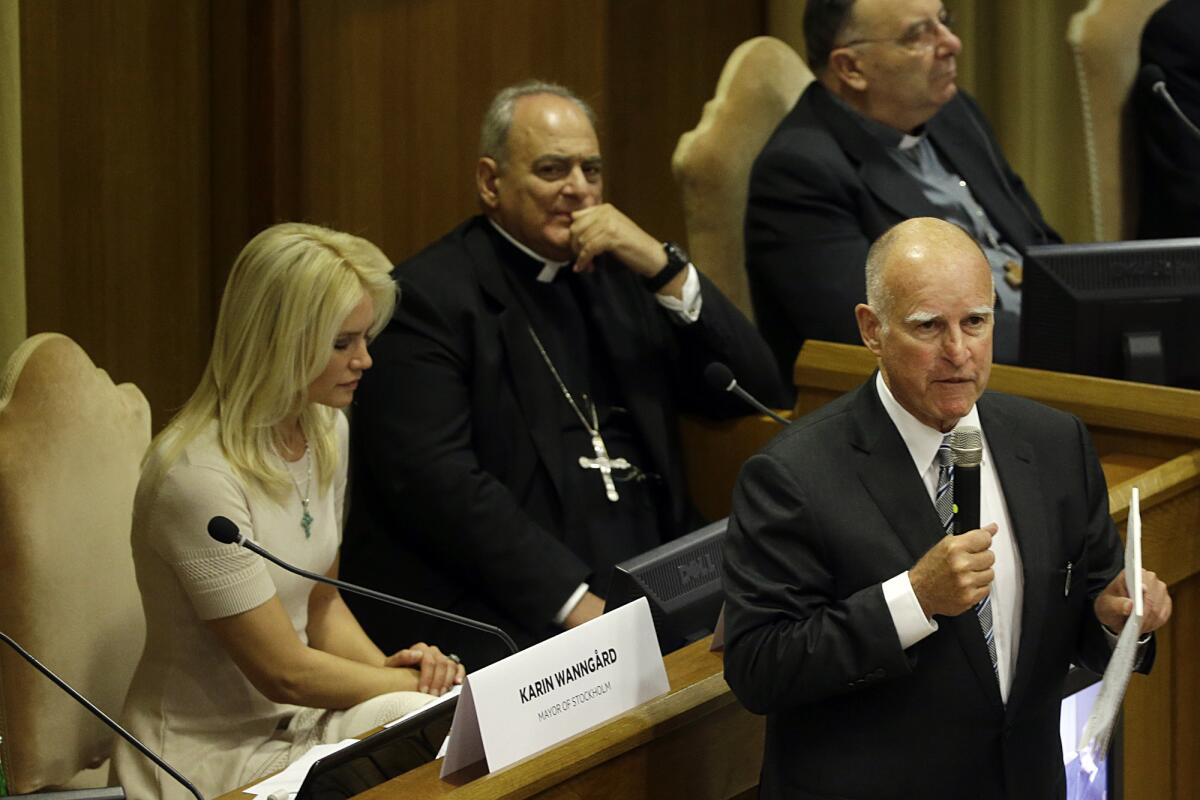
Gov. Jerry Brown delivers his speech in the Synod Hall as he attends a conference on climate change and modern slavery at the Vatican on Tuesday. Brown joined dozens of mayors from around the world at a meeting with Pope Francis to discuss reducing global warming and helping the urban poor deal with its effects.
When it comes to climate change, it’s not just the science of the issue that appeals to Gov. Jerry Brown – he sees a religious parallel.
“If you put enough carbon into the environment, you get temperature rise. That means there are some absolutes,” Brown said in a Tuesday interview with The Times' Chris Megerian.
In a way, he said, it’s an “enduring principle” not unlike those found in religion.
“I find that somewhat of an analogy to theology and to the Catholic principles I was brought up with,” Brown said.
The overlap between religion and environmental issues has been important for Brown, who studied in a Jesuit seminary when he was young. It also doesn't hurt that Pope Francis has made fighting climate change a key issue.
Here’s our story from June on how religion has influenced Brown’s politics on this and other issues.
How negotiations work at a climate summit
In a nearly two-week-long summit in which punctuation can make or break a deal, the structure and rhythm of negotiations is important, and nearly every day is critical.
For the next few days, negotiators will be working to get the less controversial subjects finished and explore possible compromises on the bigger sticking points, all before work gets kicked up to higher levels. The lower-level negotiators have a Saturday noon deadline to come up with language for a new text of a deal that narrows the options to something the big guns start with, according to French Foreign Minister Laurent Fabius, who is the president of the climate talks.
Having 185 national plans already filed helps, Fabius said.
The key is for many issues to be settled by Saturday, said Fabius, who has repeatedly mentioned the need to speed up negotiations.
Jennifer Morgan, global climate program director for the World Resources Institute, said the thousands of lower-level negotiators work in small groups that have to narrow options on each issue from, say, six to two for the higher-level officials to consider. Negotiators talk formally and informally, including on the bus rides back to the hotel.
"It's pretty clear that if this level doesn't deliver something that's much more streamlined, it just makes it much more hard for the ministers to negotiate," Morgan said.
The language negotiators are now using is "wonky and acronym laden" said Alden Meyer, strategy and policy director at the Union of Concerned Scientists. "But it's important; without it you couldn't get the ingredient."
Though it is tense, Morgan said it's not time for yelling — yet. That comes later in the higher negotiations, Purvis said.
"It's like seeing an action movie," said former U.S. climate negotiator Nigel Purvis, who is now president of Climate Advisors. "There's generally a plot, bad guys come to threaten the world. Eventually humanity rallies together and overcomes. That's the kind of thing that happens here."
Major sticking point at the summit: Carbon pricing
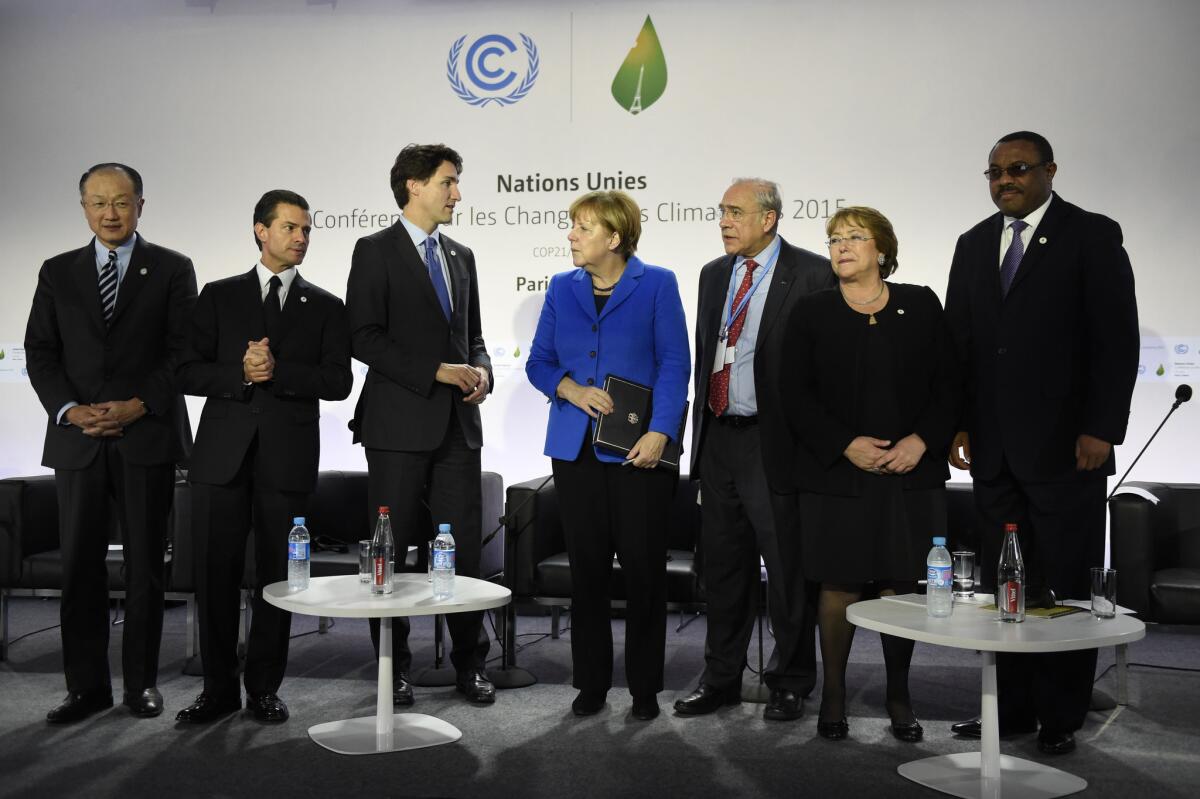
(From L) World Bank Group President Jim Yong Kim, Mexican President Enrique Pena Nieto, Canadian Prime Minister Justin Trudeau, German Chancellor Angela Merkel, OECD president Angel Gurria, Chilean President Michelle Bachelet and Ethiopian Prime Minister Hailemariam Desalegn attend the Heads of State media event on carbon pricing, as part of the COP21 United Nations conference on climate change in Le Bourget on the outskirts of the French capital Paris on November 30, 2015. More than 150 world leaders are meeting under heightened security, for the 21st Session of the Conference of the Parties to the United Nations Framework Convention on Climate Change (COP21/CMP11), also known as “Paris 2015” from November 30 to December 11. AFP PHOTO / ERIC FEFERBERGERIC FEFERBERG/AFP/Getty Images ** OUTS - ELSENT, FPG, CM - OUTS * NM, PH, VA if sourced by CT, LA or MoD **
French President Francois Hollande hosted a high-level event on the issue of carbon pricing on the first day of the climate talks, declaring that "the goal is to gradually set a sufficiently high carbon price around the world to encourage better behavior." He was supported in this initiative by leaders from Chile, Ethiopia, Germany, Mexico and Canada, but there is no global consensus on the matter, and a quick solution on carbon pricing -- a way of imposing charges on those who emit harmful carbon dioxide, or carbon dioxide equivalents, into the atmosphere -- seems unlikely.
Talks off to 'a good start,' summit head says
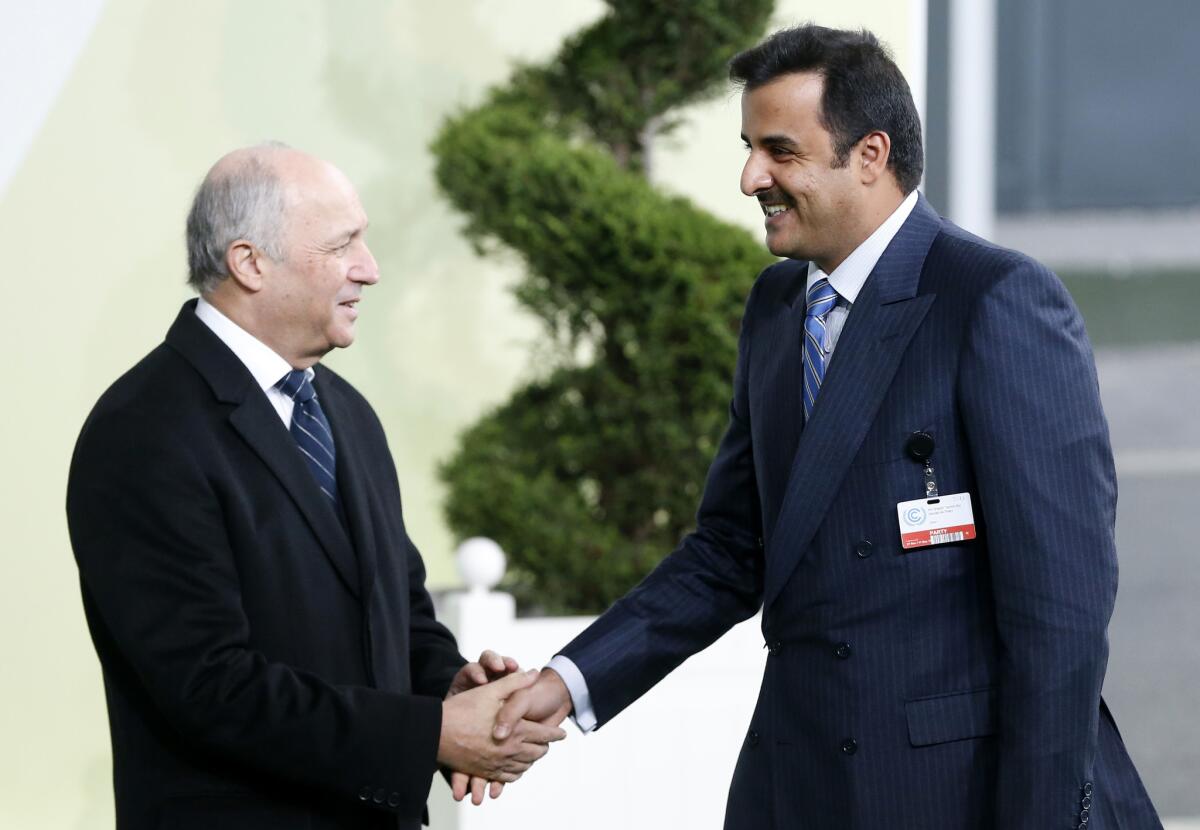
French Foreign Affairs minister Laurent Fabius, left, greets Qatar’s Emir Tamim bin Hamad Al Thani as he arrives for the COP21, United Nations Climate Change Conference, in Le Bourget, outside Paris, Monday, Nov. 30, 2015. (Guillaume Horcajuelo/Pool via AP)
The head of the climate summit said Wednesday the talks are off to "a good start" thanks to 150 world leaders who came to Paris on Monday, but that negotiations now have to speed up.
French Foreign Affairs Minister Laurent Fabius, president of the climate talks, said "there's very strong momentum" but that's not enough. He said negotiators need to get another draft of a proposed agreement to him by noon Saturday.
He said that "we must speed the process up because we have much work to do ... compromise solutions must be found as soon as possible."
Pacific islands demand help
Brown: 'I want to be an example for California'
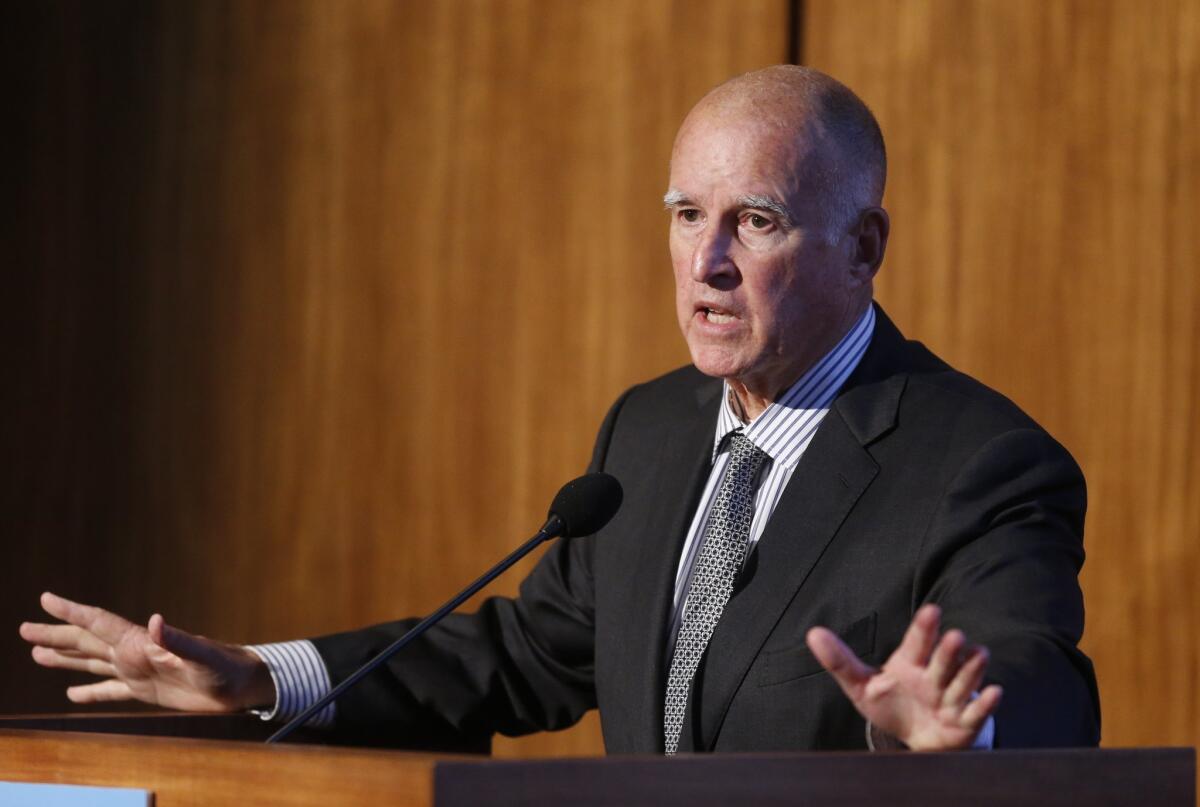
Gov. Jerry Brown speaks at the Carbon Neutrality Initiative at UC San Diego in October. Brown will be in Paris this week for the global climate change summit.
Gov. Jerry Brown was deep into a two-hour meeting on climate change with some of California’s top scientists when he interjected a highly technical and much more personal question.
He wanted to install solar panels to generate his own power on his family’s ranch in Colusa County, then find a way to feed the electricity directly into energy-efficient lighting.
"He said, 'I want to be an example for California,'" said Veerabhadran Ramanathan, an atmospheric scientist who attended the meeting in the governor’s Oakland office.
Brown’s question was about more than attempting to emulate the self-reliance of his great-grandfather, who settled the ranch generations ago. He wanted to make sure he was using technology that’s key to addressing the very modern problem of a warming planet. “The laws of nature are immutable,” Brown said in an interview. “You have to conform to them, not make them conform to you.”
Throughout his political career, Brown has displayed a desire to minimize society’s footprint on the Earth -- a stance that will gain a global platform when he arrives in Paris on Friday to participate in the U.N. summit on climate change.
Our man on the ground
Sacramento reporter Chris Megerian is headed to Paris Wednesday afternoon to closely cover the California delegation for the remainder of the summit.
You should follow him on Twitter, and you'll find his dispatches in this space.
While he's in the air, catch up on our coverage of the politics and policy surrounding climate change in California here .
Sign up for Essential California
The most important California stories and recommendations in your inbox every morning.
You may occasionally receive promotional content from the Los Angeles Times.







